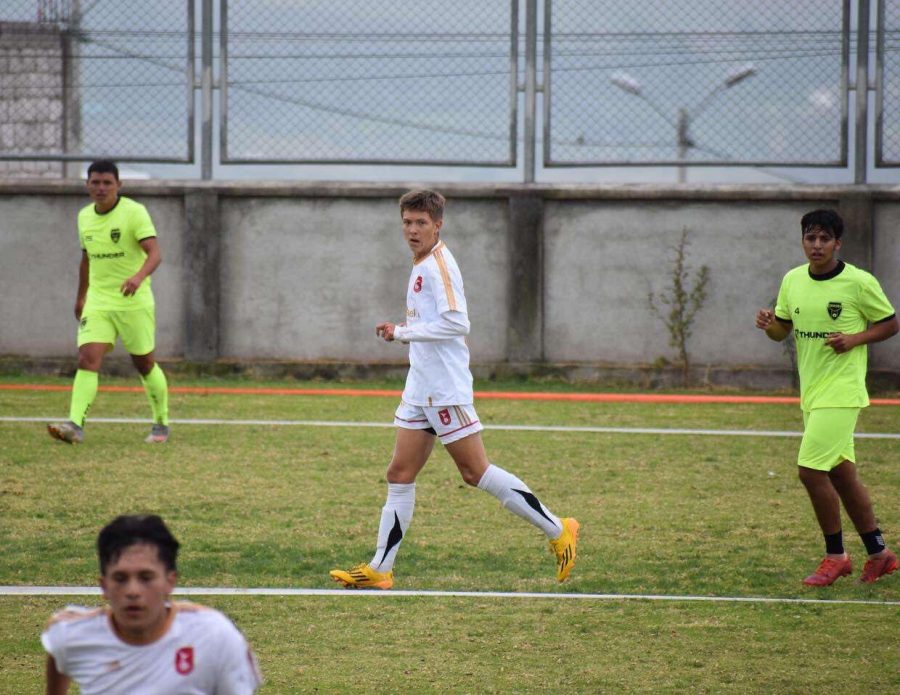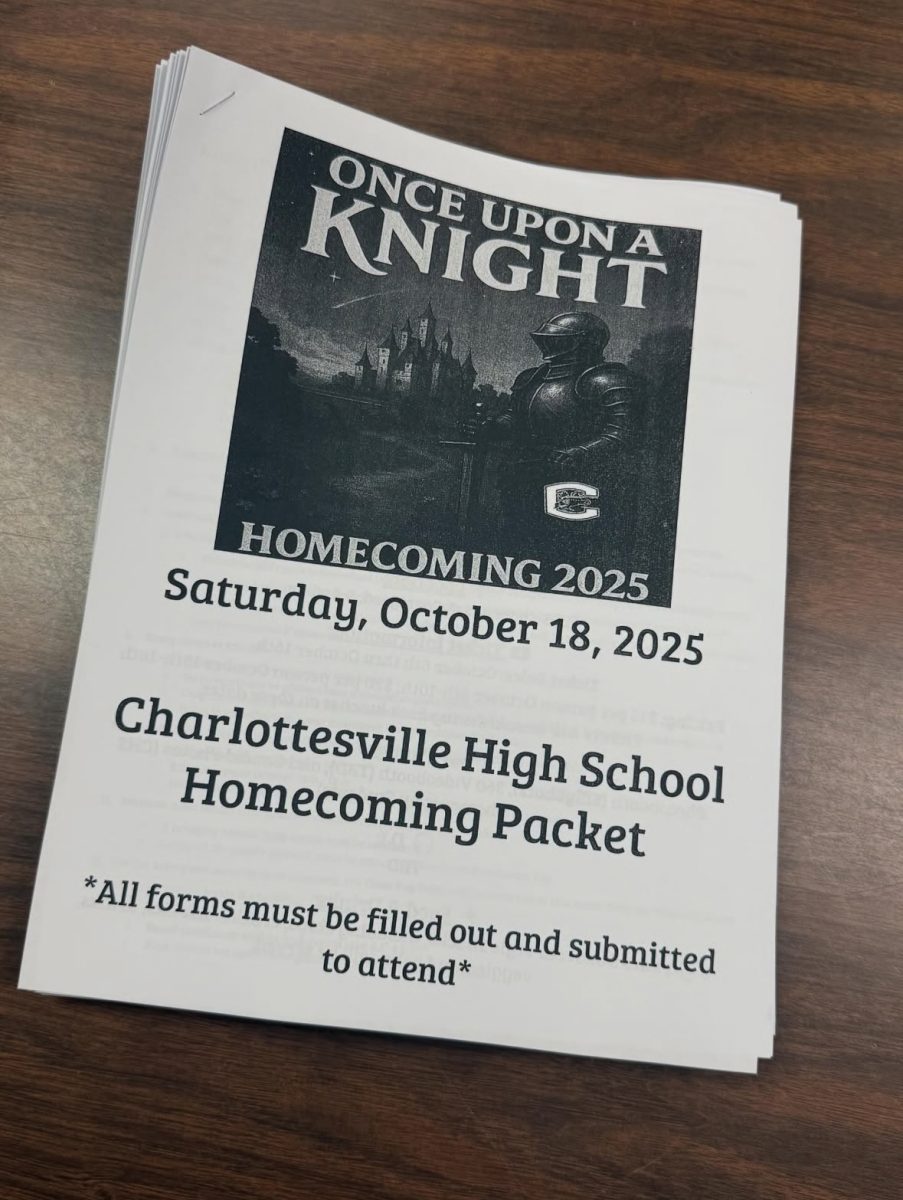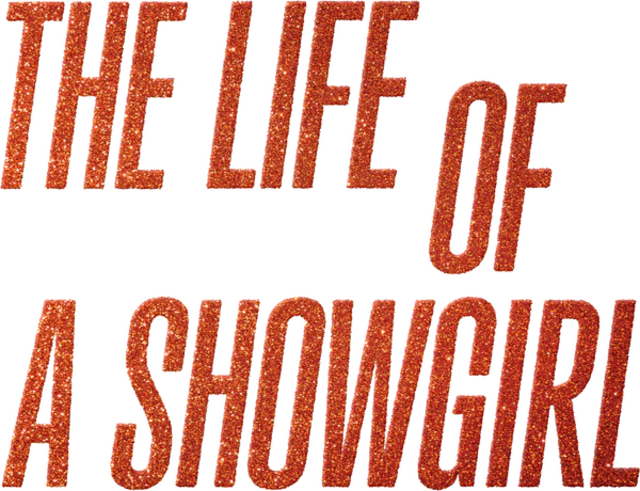Student Spotlight: Matteo Erazo
March 27, 2023
Did you know that you walk the halls with a professional soccer player? Charlottesville High School sophomore, Matteo Erazo, spent the entirety of last school year playing professional soccer in both Ecuador and Argentina. Throughout his experience, he learned a lot about the game of soccer and life by living on his own in South America, while playing professionally every day. In an interview with KTR, he discussed how he started playing soccer, his life in South America, and how the transition back to CHS is going.
Matteo’s father played soccer at Ferrum College and has since then become a soccer scout and coach, so the love for the beautiful game was instilled in him from a young age. Matteo always knew that he wanted to try and take his game to the next level and make the jump to professional soccer; so when his father told him about the possibilities in Ecuador, he jumped at the opportunity.
Matteo first tried out for Independiente Del Valle, a club in Quito, Ecuador’s capital. Independiente Del Valle is known for developing players through their youth system or lower division teams and then sending them to Europe. Currently, there are three players from that club playing in the top five European leagues. Matteo played well during his tryouts and even gained the nickname, De Bruyne, one of the worlds best players at the time, due to his long hair and midfield talent. The club did not end up offering him a spot in the academy due to his lack of Spanish and experience in professional soccer. However, they still wanted to send him to one of their lower-division teams to continue to develop. Matteo decided it would be more challenging and a better opportunity to move to Ibarra, where he was able to live with his grandparents and play for the 3rd division team, Deportivo Ibarra.
While in Ecuador, Matteo lived a very different life than the average high schooler. His day started at 7 am when he would wake up, eat breakfast, and take the 20-minute taxi ride to be at the training fields by 9. Practice would last until 11 and then Matteo would come home and try to spend as much time with his family as possible. Another main difference from life in America was the food. He ate much healthier as his family was constantly making home-cooked meals with natural ingredients as opposed to eating the junk and fast food most Americans do. There were many cultural differences and he learned a lot being in a 3rd world country; “Ecuador is a developing country. It’s very different from here. Nothing is as nice as the United States, like if you have an iPhone everyone thinks you’re rich. It’s also a problem because I don’t look like most of the kids there, so they see a white kid and they’re like oh damn he might have money on him. It happened a couple of times. I’ve seen people follow me on the streets, they call you ‘gringo’ or ‘suko’. It definitely makes you build character and learn how to take care of yourself.” In addition to the life differences, there were many differences in soccer play styles. Matteo notes that the style of play in Ecuador is faster and much more physical than in Europe or America; “My first week I was in pain, man. It’s very physical and very fast. For example, in Europe and the United States, it’s much more passive play. It’s more tactical and you have lots of time to be on the ball and look around but in Ecuador, if you dribble too much you’re gonna get hit and it’s gonna hurt.”
After a year in Ecuador, Matteo’s dad told him about an opportunity to go on trial for Argentinos Juniors, a first-division team in Buenos Aires. The program would take players from the academy to play for a month and then either sign them to a contract or put them on a lower-division team. Argentina is the next step in becoming a better player and making it to Europe for South American players so Matteo jumped at the chance and was eager to play.
Life in Argentina was very different from life in Ecuador in every aspect. To start, Matteo was on his own without any family in Argentina’s biggest city and capital, Buenos Aires. He lived in a pension, which is a house of players, with others who he was on trial with. He also notes how different the culture is, “The difference between Argentina [and Ecuador] is insane… I met players who played on the national team who met Messi, I went to stadiums, I watched the passion in Argentina, it’s insane, everyone in that country breathes soccer.” The playing style is also different: “They were more driven and had more passion…the pace is a lot faster even playing with kids my age in Argentina they kinda played similar to the 3rd division. They are very similar but there’s just something different. They are more professional I would say.”
Although some things in his daily routine stayed constant there were a couple of changes. Training would start at 8 and was only a short walk away but through a dangerous part of the city so he would normally get a ride with one of the other players or take the bus. Training would last until 11 every day and then some days they would have a team workout. After training, Matteo would spend most of his afternoons playing 5v5 futsal at a nearby court with his teammates.
While playing in South America, Matteo wasn’t allowed to get paid much a month, around 50 dollars a month, because he was under 18. So when given the chance to visit La Bombonera, which is the stadium for first division team Boca Juniors, Matteo had to make a decision. He could either choose to eat the day before or be able to afford some form of memorabilia from the stadium. Matteo chose to go hungry for a day in order to buy a shirt to remember his visit.
Throughout his time in South America, Matteo learned a lot more about life than the average high schooler does: “I learned how to take care of myself like over there it’s different. You are more prone to get robbed. I was also always by myself. I learned how to talk to people. I learned a lot of Spanish too. I matured a lot and I learned a lot of things that most kids my age don’t.”
Although Matteo has enjoyed being home, he misses certain aspects of his time abroad: “It was nice coming back and seeing my family and my friends but playing is not the same as it used to be. I get sad sometimes because I think about not playing again and the level sometimes doesn’t give you a lot of motivation to play. I think I will be going back to play again because I’ve been thinking about it a lot.”





